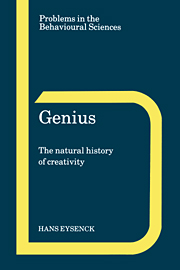Book contents
- Frontmatter
- Contents
- Introduction
- 1 The nature of genius
- 2 Genius and intelligence
- 3 Creativity: measurement and personality correlates
- 4 Conditions for excellence
- 5 Intuition and the unconscious
- 6 The nature of psychopathology: psychoticism
- 7 The roots of creative genius
- 8 From DNA to creativity and genius
- References
- Index
4 - Conditions for excellence
Published online by Cambridge University Press: 04 August 2010
- Frontmatter
- Contents
- Introduction
- 1 The nature of genius
- 2 Genius and intelligence
- 3 Creativity: measurement and personality correlates
- 4 Conditions for excellence
- 5 Intuition and the unconscious
- 6 The nature of psychopathology: psychoticism
- 7 The roots of creative genius
- 8 From DNA to creativity and genius
- References
- Index
Summary
Genius is sorrow's child.
John AdamsWorks of genius depend on the confluence of certain personality variables (intelligence, creativity, persistence, etc.) and certain social conditions; Newton, Mozart or Shakespeare would not have been able to show their true genius in a primitive culture. It is the purpose of this chapter to look at a number of social and other conditions, largely external to the individual, which facilitate or hinder the development of genius. It is not always easy to say whether these conditions have a direct causal influence on the production of works of genius, or the development of the genius himself. In epidemiology we distinguish between risk factors and causes. Risk factors are variables which are significantly correlated with specific diseases, but may not be causally related to them. Causes must be shown to be necessary and sufficient for the disease to develop. Koch's famous postulates were enunciated to give precision to this distinction, and make it clear just what was needed for a particular factor (such as the tubercle bacillus) to be regarded as a cause of tuberculosis, and not just as a risk factor.
In the scientific study of complex phenomena, this distinction is absolutely vital; we search for causal elements, but are only too often satisfied with what are mere risk factors. An example may make clear the distinction. In Denmark there has been observed over many years a correlation between the birth of a baby, and the presence of a stork's nest on the roof of the house where the baby was born.
- Type
- Chapter
- Information
- GeniusThe Natural History of Creativity, pp. 124 - 169Publisher: Cambridge University PressPrint publication year: 1995



